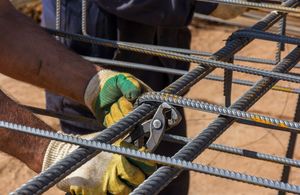UK TRA proposes anti-dumping measures on HFP Rebar from China be removed
The Trade Remedies Authority proposes anti-dumping measures on imports of Chinese HFP Rebar steel be revoked to meet demand from the UK's construction industry

In its initial findings, the UK’s Trade Remedies Authority (TRA) has today (13 July 2022) proposed that existing anti-dumping measures on imports of High Fatigue Performance Steel Concrete Reinforcement Bars (HFP Rebar) from China be revoked.
The TRA, as set out in the Statement of Essential Facts (SEF), found that keeping the measures, which have been in place since 2016, would not be in the economic interests of the UK as there is currently a high demand for affordable imported HFP Rebar from the UK construction sector in particular.
Investigation findings
All of the TRA’s transition reviews involve an Economic Interest Test to consider the economic impacts — both beneficial and harmful — of imposing a trade remedy measure.
In this case, the TRA found that the economic impact of maintaining the anti-dumping measures on HFP Rebar from China would be severe, particularly to the UK construction sector, which is worth over £108 billion annually to the UK economy.
HFP Rebar, also known as reinforcement steel and reinforcing steel, is typically used in the construction industry, which employs an estimated 1.4 to 2.2 million employees, to reinforce concrete and masonry structures to strengthen and hold the concrete in tension.
The industry has been rebounding since the COVID-19 pandemic and the TRA found a high likelihood that there will be continued high demand for HFP Rebar. However, in 2020-21, 27% of total Rebar imports came from Belarus, Russia and Ukraine. These imports are likely to drop substantially as a result of the Russian Invasion of Ukraine and the resulting sanctions. As such, high demand and an anticipated shortfall of supply means continuing the measure would increase prices paid domestically.
Our judgement is that this impact on the UK economy would outweigh the potential harm to the sole UK producer. In addition, a steel safeguard measure extended by the UK government last month applies to HFP rebar. This safeguard will limit a level of imports from China and give some protection to this UK producer.
Therefore, while the TRA found that dumping of HFP Rebar is likely to recur if the measures are revoked and that injury to the UK production would occur, it is not in the economic interests of the UK for the measures to be kept.
TRA Chief Executive Oliver Griffiths said:
We have a duty to weigh up the impact of dumping on UK producers against the broader effects on the UK economy of imposing tariffs. In this case, our assessment is that high domestic demand and international supply shortages mean that retaining tariffs on HFP Rebar from China would push up prices for key elements of the UK economy, such as construction. Our judgement is that the impact on the British economy of higher prices would significantly outweigh the impact on the sole UK producer of rebar of removing tariffs on Chinese imports.
Following today’s publication, there will be a 30-day period in which interested parties can comment on the report. Comments can be submitted by Interested Parties to the TRA via the Trade Remedies Service website.
The TRA will then consider and produce a Final Recommendation, which will be sent to the Secretary of State for International Trade who will make the final decision on whether to uphold the TRA’s recommendation. The government is able to ‘call in’ the case at any point in the investigation, to instruct the TRA to undertake further or different analysis in the case.
Notes to editors:
-
Read more about how a UK Economic Interest Test is conducted.
-
The UK industry for HFP Rebar comprises one verified producer, which is estimated to employ around 700 employees and contributes around £41m per year to the UK economy.
-
In contrast, the TRA identified 36 domestic importers of HFP Rebar. Just eight of these employed around 1,780 employees and contributed around £180m to the UK economy.
-
Furthermore, the main UK market for HFP Rebar is in construction. Construction is a significant sector in the UK economy with an estimated 1.4 to 2.2 million employees and contributes around £108 billion per year to the UK economy.
-
Between 2017 and 2021, Russia, Ukraine and Belarus have accounted for 20%-40% of imports of HFP Rebar to the UK. It is likely that these imports will completely cease due to the Russian Invasion of Ukraine and resulting sanctions. This means there is a significant risk of shortages of supply of HFP Rebar for the construction sector.
-
Anti-dumping duties allow a country or union to take action against goods sold at less than their normal value, which is defined as the price for ‘like goods’ sold in the exporter’s home market.
-
Trade remedy investigations were carried out by the EU Commission on the UK’s behalf until the UK left the EU. Forty-four EU trade remedy measures of interest to UK producers were carried across into UK law when the UK left the EU and the TRA is currently reviewing each one to assess whether it is suitable for UK needs.
-
The European Commission imposed anti-dumping duties on imports of HFP Rebar from China in July 2016. This is the transitioned measure that was subject to the TRA’s transition review. The Commission allowed the EU measure to expire on 29 July 2021 without review.
-
The Trade Remedies Authority (TRA) is the independent UK body, established in June 2021, as the first non-departmental public body of the Department for International Trade, that investigates whether trade remedy measures are needed to counter unfair import practices and unforeseen surges of imports.
-
Read more about the TRA’s mission in its Business Plan.